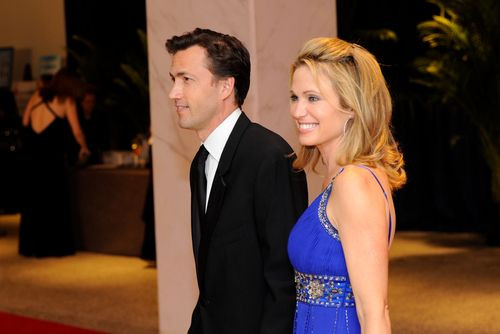'Good Morning America's' Amy Robach Diagnosed With Breast Cancer After On-Air Mammogram

News correspondent for ABC’s “Good Morning America,” Amy Robach, was interviewing the wife of an Amish schoolteacher when a producer asked her if she would ever agree to an on-air mammogram to test for breast cancer as part of the show's GMA Goes Pink day. She was 40, she thought. It was time.
But it wasn’t until weeks later when Robach found out — alone — that her results came back positive for breast cancer.
“Sitting in that kitchen with Marie Monville, I had cancer and didn't know it,” Robach wrote for ABC News. “In fact, I would have considered it virtually impossible that I would have cancer. I work out, I eat right, I take care of myself, and I have very little family history; in fact, all of my grandparents are still alive.”
It was a tumultuous year, Robach said. She was running around the country, covering stories, interviewing subjects, and raising her children — so busy that she would always slip the preventative tests under the rug. “I started thinking, ‘Wow, if I put it off, how many other people have put it off as well?’”
Robach’s diagnosis calls for a bilateral mastectomy, which will take place on Nov. 14, followed by reconstructive surgery. “Only then will I know more about what that fight will fully entail,” she explained, “but I am mentally and physically as prepared as anyone can be in this situation.”
Breast cancer is the most common form of cancer in the United States, behind only certain forms of skin cancer. According to the Centers for Disease Control and Prevention (CDC), women received breast cancer diagnoses 206,966 times in 2010, the most recent year the data is available. In the same year, breast cancer accounted for 40,996 female deaths.
Currently, mammograms remain the most effective way to screen for early stages of breast cancer, spotting it before the growing tumors become easily detectable through self-examinations or cause symptoms. While Robach received what she called "a tornado of tests" thereafter, to conclusively diagnose the substance as cancer, doctors told Robach that her live mammogram, which took place in front of a viewing audience of millions, effectively saved her life.
“I was also told this: for every person who has cancer, at least 15 lives are saved because people around them become vigilant. They go to their doctors, they get checked,” she wrote.
A big part of Robach’s decision to get tested, she says, was the encouragement from on-air co-star Robin Roberts, who told Robach that even saving just one life through urging people to get tested was worth it.
“It never occurred to me,” she said, “that life would be mine.”
Published by Medicaldaily.com



























